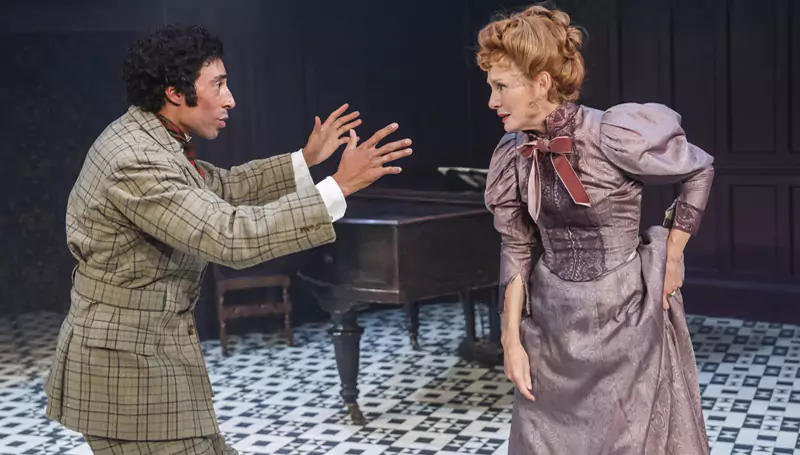“The Cabinet Minister” at Menier Chocolate Factory
Neil Dowden in South London
6 October 2024
Born in 1855 – the year between the births of Oscar Wilde and George Bernard Shaw – Arthur Wing Pinero was one of the most popular late Victorian playwrights, though his work is revived far less often than his more famous contemporaries. He made his name with farces in the 1880s, before going on to serious social issue dramas such as The Second Mrs Tanqueray in the 1890s. One of the former is The Cabinet Minister (1890), which has now been adapted by Nancy Carroll (who also stars) for the Menier Chocolate Factory with hilarious success.

Nicholas Rowe and Nancy Carroll.
Photo credit: Tristram Kenton.
The intrigue centres around the Twombley family, with the eponymous Right Honourable Sir Julian likely to lose his job and reputation in the wake of a financial scandal, while the overspending of his wife Lady Katherine and son Brooke have got the family into severe debt. Their debutante daughter Imogen is under pressure to marry into wealth, though she loves her childhood sweetheart and recently returned explorer Valentine White. Meanwhile, Lady Katherine’s upwardly mobile dressmaker Fanny Lacklustre acquires evidence of their debt and forces them to borrow money from her insolent moneylending brother Bernard.
In another format The Cabinet Minister could be a melodrama but Pinero exposes the hypocrisy and snobbery of a class-bound society through a humorous lens which leans more towards the farcical than the satirical end of the comic spectrum. Sir Julian is supposed to be a pillar of the establishment but he abuses his position for his pecuniary advantage. The well-heeled Lady Katherine herself is from a modest rustic background, though she turns her nose up at Fanny’s vulgar manners – and is not above venturing into insider trading. But although most of the characters are morally compromised, you can’t help rooting for the hapless, gormless Twombleys to dig themselves out of the hole that they have dug.
Carroll has done an excellent job in her accessible adaptation. She performed in Pinero’s farce The Magistrate at the National Theatre in 2012, then during the Covid pandemic researched possible projects that would bring some light relief to those dark times. There is a little contemporary resonance with the corruption of political leaders, though this is lightly dealt with by Pinero, and Carroll does not try to over-egg it. Instead, she has produced a streamlined version of the play, cutting out some of the subplots as well as arcane references. The result is a sparkling jeu d’esprit including sly asides to the audience, with witty one-liners and double entendres galore.

The company.
Photo credit: Tristram Kenton.
This sprightly comedy is beautifully realized in Paul Foster’s fast-paced production, which doesn’t take itself too seriously unlike the characters – as all good farces should do. The fabulously detailed set designs by Janet Bird show the action moving from the Twombleys’ homely chintz-wallpapered and tiled-floor conservatory in London, with its fanlights, family photos, flowers, and wicker chairs, to the grander inner hall of Drumdurris Castle in Scotland, with oak panelling, chandeliers, solid furniture, tartan décor, and mounted stag heads. Her costumes are a delight too, incorporating formal dress, military uniform, and kilts, with Lady Katherine in particular changing colourful costumes multiple times. Each of the four acts is preceded by lively music from Sarah Travis, performed by some of the cast.
Despite the play’s title, the main character here is Lady Katherine Twombley, superbly played by high-comedy specialist Nancy Carroll with the right balance of charming naivety and risk-taking opportunism as a parvenu determined not to go under. Nicholas Rowe’s Sir Julian is an amusing mixture of the pompous and unscrupulous. Rosalind Ford nicely plays up Imogen’s childlike innocence, especially in scenes with George Blagden’s posh-boy-roughing-it Valentine.
Sara Crowe is Sir Julian’s interfering sister Dowager Countess of Drumdurris overflowing with “motives”, with the scene-stealing Dillie Keane as the stick-brandishing, domineering Lady Macphail and Matthew Woodyatt as her repressed, socially awkward son Sir Colin a wonderfully funny double act. Phoebe Fildes is the brazenly blackmailing Fanny Lacklustre tactically switching between genteel and working-class accents, while Laurence Ubong Williams plays her brother Bernard as a social-climbing Cockney wide boy – who in a brief coda we glimpse as a slick twenty-first-century speculator.









